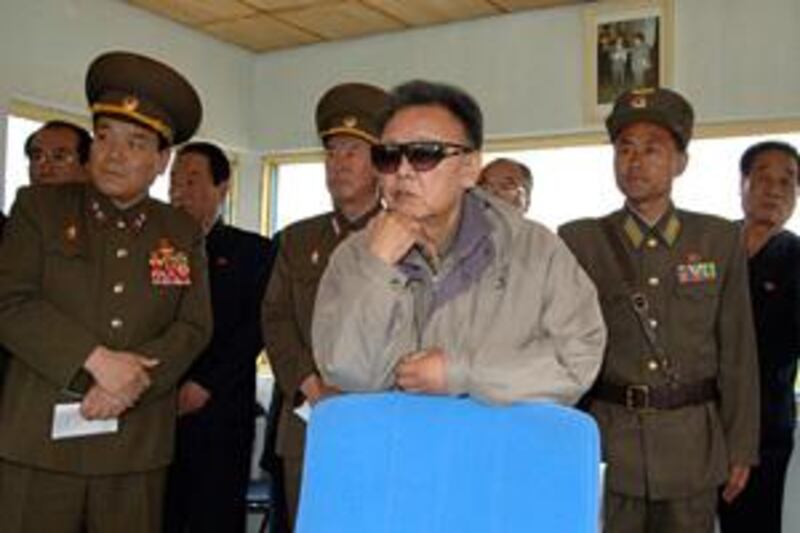BEIJING // Barack Obama sternly warned North Korea after Pyongyang's second nuclear detonation and a test-firing of three missiles that such provocations would "only serve to deepen North Korea's isolation". The US president perhaps did not know that "isolation" is in fact what North Korea wants. The common theory explaining North Korea's penchant for crisis escalation - which was further heightened yesterday when it test fired a pair of short-range missiles - has been that it is to get the attention of the Obama administration and to bring Washington to the bargaining table. Now, however, some analysts are presenting an alternative to this reading. Something else is going on inside North Korea, they say - something that directly concerns paving the way for a successor to North Korea's ailing leader, Kim Jong Il. Pyongyang has refused repeated attempts by the Obama administration to establish contact this year, indicating that in North Korea a greater priority outweighs bilateral negotiation with the United States, which it once eagerly sought. Analysts point out that North Korean leaders seek quiet time for a smooth power transition, which requires "isolation" from the world. This is how Tetsuo Kotani, a security expert at the Ocean Policy Research Foundation in Tokyo, sees the situation. "Pyongyang's hardline posture is a 'leave us alone' message, pending the succession issue. "North Koreans know that if they conduct a nuclear test and fire missiles that will make it much more difficult for the Obama administration to be supportive of the engagement strategy and there won't be six-party talks," he said. "They then can concentrate on domestic issues because six-party talks are the only venue for the international community to engage North Korea." Shi Yinhong, a North Korea expert at Renmin University in Beijing, said: "North Korea's hardened posture is primarily due to North Korea's domestic problems. They've now begun a very difficult and very sensitive succession process." Scott Snyder, director of the Center for US-Korea Policy at the Asia Foundation based in Washington, agreed. "The main political target for the tests is domestic. The attempt to influence the Obama administration is the secondary target." North Korea's toughened posture and the sudden illness of Mr Kim, who suffered a stroke last summer, reveal, to a certain extent, that it is not fully prepared for the succession process, analysts say. Fitting into this view is the recent promotion of some generals at the National Defence Commission, the country's most powerful apparatus, of which Mr Kim is chairman. Mr Shi sees this as Mr Kim's forming a "regent committee" of loyal generals to make way for his third and youngest son to succeed him. On April 9, the Supreme People's Assembly revised its constitution, but did not disclose the changes. Japanese media on May 21 said the changes included upgrading Mr Kim's title from the chairman of the National Defence Commission to "Nation's Supreme Leader". That, analysts view, indicates the completion of the process of legalising Mr Kim's authority by spelling out the absolute nature of his power, which in turn will allow for a smooth transition of power to the next leader, whom Mr Kim will pick. "Until this domestic dust settles down, it will be difficult for North Korea to turn to tactical flexibility in its dealings with the international community," Mr Shi said. Mr Snyder said: "The façade of North Korea being 'internally focused' makes it look conservative. At this point, they don't want to reach out to the international constituency." North Korea's effort to keep foreign influence at bay during the succession process comes from a suspicion that some foreign countries might attempt to foment regime change during a volatile and vulnerable time. Observers also suspect there may be a power struggle to succeed Mr Kim. North Korea expelled international inspectors at its nuclear site recently and virtually paralysed the inter-Korean industrial park, Kaesong, run by South Koreans inside the North's territory, significantly reducing the number of South Koreans who had access to the North. The North has long feared the "infiltration of capitalistic influence" brought by South Koreans. According to Daniel Sneider, an expert on North Korea of the Shorenstein Asia-Pacific Research Centre at Stanford University in California, all of this is again "the product of internal dynamics" of North Korea. "There's an emergence of the third son getting elevated to be the successor. But they also need time to prepare for the succession." If the North Koreans shut down Kaesong, it is because they foresee it subverting their control over society, Mr Sneider said. Dong Yong-sueng, chief security analyst on North Korea with the Samsung Economic Research Institute in Seoul, cautioned against any exclusive attitude. "The common trap for outsiders to fall into when looking at North Korea is that while we believe we are complex, we tend to look at North Korea in a simplified frame. "On one hand, North Koreans need to do in-house keeping regarding the heir. On the other hand, they want to get the US to the negotiation table as well. Besides, they want to be recognised as a nuclear state. In addition, they also want to take advantage of the power circus played by China and the US. "Pyongyang's toughened posture is the result of comprehensive consideration of the multiple underlying factors and its conclusion that a toughened posture at this time would serve the best strategic interest to its grand scheme."
slee@thenational.ae





